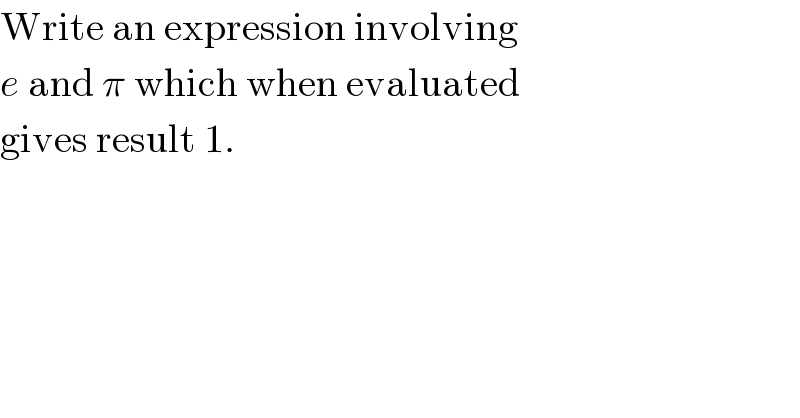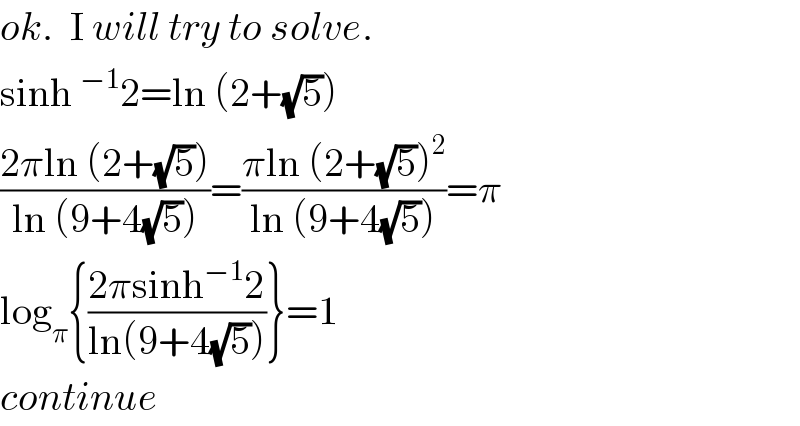
Question Number 8644 by prakash jain last updated on 19/Oct/16

$$\mathrm{Write}\:\mathrm{an}\:\mathrm{expression}\:\mathrm{involving} \\ $$$${e}\:\mathrm{and}\:\pi\:\mathrm{which}\:\mathrm{when}\:\mathrm{evaluated} \\ $$$$\mathrm{gives}\:\mathrm{result}\:\mathrm{1}. \\ $$
Commented by Yozzias last updated on 19/Oct/16

$$\mathrm{ee}^{−\mathrm{1}} \pi\pi^{−\mathrm{1}} =\mathrm{1} \\ $$
Commented by prakash jain last updated on 19/Oct/16

$$\mathrm{Valid}\:\mathrm{answer}\:\mathrm{but}\:\mathrm{i}\:\mathrm{was}\:\mathrm{expecting} \\ $$$$\mathrm{like}\:−{e}^{{i}\pi} =\mathrm{1} \\ $$
Commented by Yozzias last updated on 20/Oct/16
![2(√((1−(1/3)+(1/5)−(1/7)+(1/9)−...)))[eΓ(1/2)Σ_(n=1) ^(3000) n]{∫_0 ^e^(−1) π^(Γ(1/2)) dx}[∫_0 ^(3001) π^((3/2)+Γ(1/2)) ⌊x⌋dx]^(−1) ((d/du)(u(√(2/π)))){((πe^(−1) )/4)lim_(n→∞) ((n/n^2 )+((n+1)/n^2 )+...+((3n)/n^2 ))}e^({sin(π/(√4))+cos(π/(√4))}{cosh(1/π)+sinh(1/π)}e^(−π^(−1) ) ) log_π {((2πsinh^(−1) 2)/(ln(9+4(√5))))} =1](Q8657.png)
$$\mathrm{2}\sqrt{\left(\mathrm{1}−\frac{\mathrm{1}}{\mathrm{3}}+\frac{\mathrm{1}}{\mathrm{5}}−\frac{\mathrm{1}}{\mathrm{7}}+\frac{\mathrm{1}}{\mathrm{9}}−...\right)}\left[\mathrm{e}\Gamma\left(\mathrm{1}/\mathrm{2}\right)\underset{\mathrm{n}=\mathrm{1}} {\overset{\mathrm{3000}} {\sum}}\mathrm{n}\right]\left\{\int_{\mathrm{0}} ^{\mathrm{e}^{−\mathrm{1}} } \pi^{\Gamma\left(\mathrm{1}/\mathrm{2}\right)} \mathrm{dx}\right\}\left[\int_{\mathrm{0}} ^{\mathrm{3001}} \pi^{\frac{\mathrm{3}}{\mathrm{2}}+\Gamma\left(\mathrm{1}/\mathrm{2}\right)} \lfloor\mathrm{x}\rfloor\mathrm{dx}\right]^{−\mathrm{1}} \left(\frac{\mathrm{d}}{\mathrm{du}}\left(\mathrm{u}\sqrt{\frac{\mathrm{2}}{\pi}}\right)\right)\left\{\frac{\pi\mathrm{e}^{−\mathrm{1}} }{\mathrm{4}}\underset{\mathrm{n}\rightarrow\infty} {\mathrm{lim}}\left(\frac{\mathrm{n}}{\mathrm{n}^{\mathrm{2}} }+\frac{\mathrm{n}+\mathrm{1}}{\mathrm{n}^{\mathrm{2}} }+...+\frac{\mathrm{3n}}{\mathrm{n}^{\mathrm{2}} }\right)\right\}\mathrm{e}^{\left\{\mathrm{sin}\frac{\pi}{\sqrt{\mathrm{4}}}+\mathrm{cos}\frac{\pi}{\sqrt{\mathrm{4}}}\right\}\left\{\mathrm{cosh}\frac{\mathrm{1}}{\pi}+\mathrm{sinh}\frac{\mathrm{1}}{\pi}\right\}\mathrm{e}^{−\pi^{−\mathrm{1}} } } \mathrm{log}_{\pi} \left\{\frac{\mathrm{2}\pi\mathrm{sinh}^{−\mathrm{1}} \mathrm{2}}{\mathrm{ln}\left(\mathrm{9}+\mathrm{4}\sqrt{\mathrm{5}}\right)}\right\} \\ $$$$=\mathrm{1} \\ $$
Commented by prakash jain last updated on 20/Oct/16

$${ok}.\:\:\mathrm{I}\:{will}\:{try}\:{to}\:{solve}. \\ $$$$\mathrm{sinh}\:^{−\mathrm{1}} \mathrm{2}=\mathrm{ln}\:\left(\mathrm{2}+\sqrt{\mathrm{5}}\right) \\ $$$$\frac{\mathrm{2}\pi\mathrm{ln}\:\left(\mathrm{2}+\sqrt{\mathrm{5}}\right)}{\mathrm{ln}\:\left(\mathrm{9}+\mathrm{4}\sqrt{\mathrm{5}}\right)}=\frac{\pi\mathrm{ln}\:\left(\mathrm{2}+\sqrt{\mathrm{5}}\right)^{\mathrm{2}} }{\mathrm{ln}\:\left(\mathrm{9}+\mathrm{4}\sqrt{\mathrm{5}}\right)}=\pi \\ $$$$\mathrm{log}_{\pi} \left\{\frac{\mathrm{2}\pi\mathrm{sinh}^{−\mathrm{1}} \mathrm{2}}{\mathrm{ln}\left(\mathrm{9}+\mathrm{4}\sqrt{\mathrm{5}}\right)}\right\}=\mathrm{1} \\ $$$${continue} \\ $$
